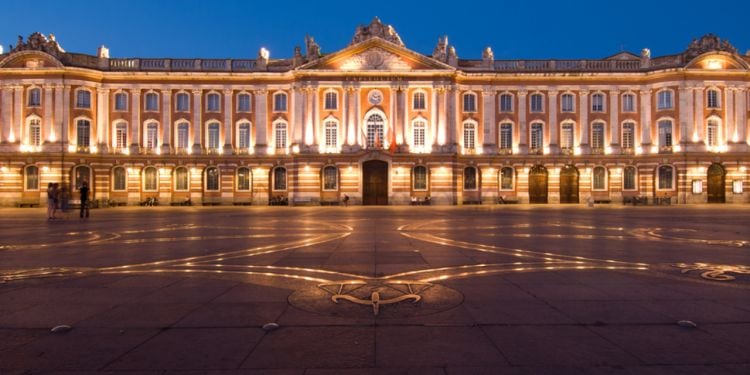
With more than 100,000 students, Toulouse ranks as the fourth-top student city in France. Known for its warm, historic charm, Toulouse is also a key player in the fields of aeronautics (home to Airbus), IT, and space industries. Given its prominence as a hub for high-tech sectors, the city draws students globally, particularly those interested in specializing in sciences.
Toulouse is a perfect choice for international students seeking a well-rounded educational experience. Renowned for its academic excellence, multicultural atmosphere, high quality of life, and cultural diversity, the "Pink City" provides a nurturing environment for higher education. International students are warmly embraced in this vibrant city, which fosters inspiration and supports them in achieving their academic and personal aspirations.
Public universities in France
French universities operate on the European Credit Transfer System (ECTS).
There are two ways to continue your studies in the French higher education system:
- through the expensive but highly reputed "grandes écoles". After 2 years of preparatory classes, you must pass a competitive entrance examination to be admitted to these schools;
- by joining a public university offering a wide range of courses and degrees.
These institutions offer excellent research opportunities and affordable tuition fees compared with universities in other countries, such as the USA or the UK. However, tuition fees differ depending on whether or not you are a European citizen.
Toulouse's main universities
Université Paul Sabatier Toulouse 3
Université Paul Sabatier 3 belongs to a prestigious group of the world's oldest universities, alongside Oxford and La Sorbonne. The institution strongly focuses on the sciences, as evidenced by its motto, "Science in the heart". By science, the institution refers to the sciences in their purest definition: health sciences (midwifery, physiotherapy), sports sciences (anatomy, physiology), and engineering sciences (physics, mathematics, computer science). However, communication and management are also studied. What's more, Université Paul Sabatier is ranked 511th best university in the world. Its Earth and Marine Sciences program ranks among the top 200 in the world.
The university also has a strong research program supported by teams of researchers in five research directorates. As far as funding is concerned, part of its budget comes directly from companies, public funding agencies, and the European Community.
Paul Sabatier University welcomes foreign students, but while some doctoral and master's programs are conducted in English, most courses are taught in French. For those lacking the necessary French proficiency, the university provides intensive language courses.
As a foreign student, you can study in France through the Erasmus exchange program if you are a European national or through a partnership agreement with your university.
Toulouse 1 Capitole University
Toulouse 1 Capitole University provides a variety of specialized courses in law, economics, management, economic and social administration, computer communications and information technology, mathematics and its applications, political science, and languages. According to the QS 2024 ranking, the university's economics and econometrics programs receive the highest acclaim.
Foreign exchange students have the flexibility to select their courses from an open list. Each degree program awards a specific number of ECTS credits, which can be transferred and validated by your home university. Additionally, there is good news for foreign students as the university is expanding its offerings of courses taught in English!
The ESN Toulouse Association is responsible for welcoming and supporting foreign students throughout the year. They can also benefit from an Eiffel scholarship program.
University of Toulouse 2 Jean Jaurès
Toulouse Jean Jaurès University is an interdisciplinary institution that offers a diverse array of programs, including arts, humanities, languages, social sciences, computer mathematics, economics, and management. Its notable alumni include presenter Hélène Jouant, and it counts among its historical associations the influence of renowned French writers and philosophers of the Renaissance, possibly including Rabelais and Montaigne. The university is affectionately known as "le Mirail", named after its main campus in the Mirail district. Until 2014, it was recognized as "Université de Toulouse 2 Le Mirail”.
For the record, the university is committed to preserving the environment through eco-responsible actions.
Many courses are taught in English for foreign students, and entry requirements may vary depending on whether the student is a European or non-European national.
Administrative formalities for studying in Toulouse
Students who are citizens or residents of a European Union or EFTA (European Free Trade Association) country are exempt from visa requirements to study in France.
Students from non-EU countries must apply for and obtain a student visa, as detailed here. If your stay extends beyond 6 months, you must apply for and acquire a residence permit.
Financing your studies in France
As an international student, you can fund your studies through grants from your home country or subsidies from the French university where you'll be enrolled. Specific organizations also offer assistance to those with limited financial means. For comprehensive information, visit the "Finance your studies" section on the France Diplomatie website.
Foreign students can also work in France, provided they are covered by social security and have a residence permit if they are not from the European Union.
Doing an internship in France
Regulations governing internships in France are the same for foreign students (European or otherwise) as for French students. If you are not a citizen of a European Union country, your student visa will allow you to undertake an internship, albeit under restricted conditions.
Working in France after graduation
Students from the European Union wishing to live and work in France after graduation can stay without restriction. On the other hand, foreign students must comply with certain conditions relating to the degree they have obtained, the amount of their salary, etc.
Student accommodation in Toulouse
Toulouse CROUS reserves around 28% of its university residence accommodation for foreign students. When looking for university accommodation, don't hesitate to contact Campus France. To apply for residence accommodation, you must go to the Mon logement Crous website.
If you'd prefer to live in a studio or small two-room apartment, there are plenty of properties available throughout the city, managed by private individuals or real estate agencies. These are usually rented unfurnished, but you'll also find some already furnished. You can search on sites such as Immo Jeunes, Le Bon Coin, Studapart, Fac Habitat, and Location Étudiant.
Foreign students interested in sharing (ideal for practicing their French or English!) can consult websites like Adele, Appartager, Loc service, and La Carte des colocs. Finally, you can rent a single room with a host family via sites such as Roomlala.
Cost of living in Toulouse
Student accommodation in Toulouse costs between 300 and 1000 euros per month, depending on location and size. When it comes to food, Toulouse offers a wide range of university restaurants (Resto-U), cafeterias, brasseries, and other affordable eateries, perfect for students on a budget (count 3.30 euros per meal for non-grant-holders; 1 euro for grant-holders or students in precarious situations).
Students under 26 can benefit from a discount on the Tisséo network, which manages the city's public transport system (metro, bus, streetcar). An annual subscription costs 133 euros. Want to get around by bike? A yearly subscription to Vélô Toulouse, a self-service bicycle network, can cost between 20 and 25 euros per year, depending on your situation.
Discounts are also available at specific venues, such as the Orchestre national de Toulouse, where a ticket for anyone under 27 costs 5 euros. Theater and cinema also offer preferential rates for students. In addition, many restaurants and fast-food chains offer all students a menu at a reduced price. Hairdressing and beauty salons also benefit all students in Toulouse, such as several gyms and activities to enjoy with friends, such as Escape Games.
As a foreign student in Toulouse, you'll need a budget of around 800 euros per month to cover tuition fees, school supplies, and other additional expenses. Bear in mind, however, that you'll also need to pay for compulsory health insurance. Foreign nationals under 28 years of age who have been studying in France for more than 4 months must register with the French social security system for foreign students to have their healthcare costs covered.
The best areas to live as a student in Toulouse
Toulouse is a vibrant city that attracts numerous students each year. While the city has excellent public transportation connections, especially to its universities, seeking accommodation near your school is advisable for convenience. CROUS student residences are typically located close to universities. Generally, the Left Bank of Toulouse is highly recommended for students due to its excellent transport infrastructure and proximity to the city's universities and grandes écoles.
Apart from memorable evenings in the Carmes district, you'll discover available student housing for rent. Alternatively, if you prefer a tranquil environment, you'll enjoy the Saint Cyprien district for its village-like atmosphere, local shops, and pleasant surroundings, alongside the vibrancy of Carmes.
Saint-Étienne is another peaceful district favored by students, as is Les Amidonniers, which is also quiet and conveniently close to downtown Toulouse.
For those who enjoy lively surroundings, the Saint Aubin district is an ideal place to settle during your studies in Toulouse. On the other hand, if you're on a tight budget, the Saint Michel district offers some of the most affordable rents. Alternatively, you can explore La Busca, which offers many university accommodation options.
Leisure activities in Toulouse
Toulouse boasts numerous historic monuments waiting to be explored. Begin by crossing and admiring the city's iconic bridges, such as Pont Neuf, Pont Saint Pierre, and Pont des Catalans. The Basilica of Saint-Sernin, featuring crypts and an ambulatory, is a must-visit, along with the Library of Studies and Heritage, ideal for students. As you wander through the city, you'll encounter many ancient buildings, including Hôtel du Vieux Raisin, Hôtel de Pierre, Hôtel Dieu Saint Jacques, and Hôtel de Bernuy. Concluding this selection of historic sites, don't miss the Salle des Illustres and the cloisters of the Augustins.
Toulouse is a renowned hub for aerospace and aeronautics, and visiting the Cité de l'espace is essential. Students can take advantage of a discounted admission rate.
Lastly, if you are passionate about culture, history, and art, explore Toulouse's numerous museums, wander along the banks of the Garonne or the Canal du Midi, and savor the flavors of southwestern French gastronomy!
Student life also means plenty of nightlife in the city's meeting places and bars. The districts of Les Carmes, Saint Cyprien, Place Saint Pierre and Capitole, Gabriel Péri, and Saint-Aubin, as well as Jean Jaurès, are the places where you'll find plenty of bars, pubs, clubs, and restaurants in which to party.
Useful link:
We do our best to provide accurate and up to date information. However, if you have noticed any inaccuracies in this article, please let us know in the comments section below.












Comments